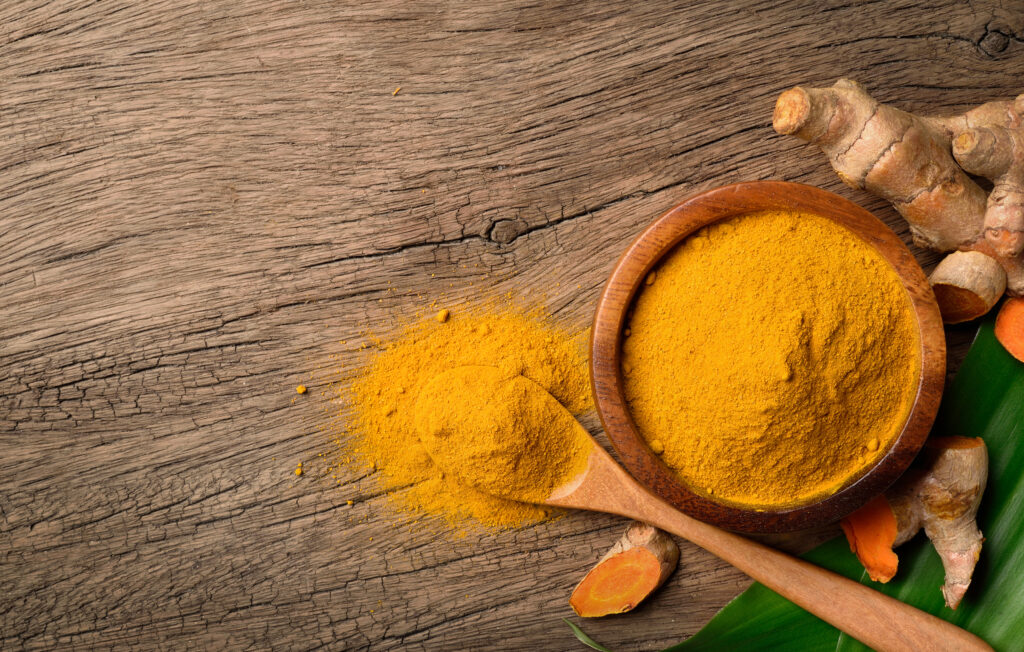
Image: Photoongraphy/Shutterstock
Supplementation with 500 mg of curcumin, four times daily, is comparable to the drug omeprazole (Prilosec) for reducing symptoms of dyspepsia, according to a recent double-blind, head-to-head study published in the British Medical Journal’s Evidence-Based Medicine.
Pradermchai Kongkam and colleagues at the Department of Internal Medicine, Chulalongkorn University Faculty of Medicine, Bangkok, randomized 209 patients diagnosed with functional dyspepsia to treatment with curcumin alone (two 250-mg capsules, 4x daily), omeprazole alone (one 20 mg capsule, once daily), or a combination of both treatments, for eight weeks (56 days).
Functional dyspepsia is generally defined as recurring stomach upset, in the absence of peptic ulcer or any other obvious cause. Symptoms include upper abdominal pain or burning, bloating, belching or nausea, and in some cases, premature sensation of satiety. The symptoms may or may not be directly related to meals.
In this study, Dr. Kongam and his team evaluated the participants at baseline, on Day 28, and again on Day 56, using the Severity of Dyspepsia Assessment (SODA) scale. SODA is a standardized, well-validated tool that quantifies a patient’s self-experience of pain and non-pain related symptoms of dyspepsia, as well as psychometric variables, and factors like medication use.
They enrolled and randomized 206 patients, 151 of whom completed the trial. The cohort had a mean age of 50 (±12 years), and nearly three-quarters (73%) were women.
Significant Improvements
By Day 28. all three treatment groups showed statistically-significant and clinically meaningful reductions in mean SODA scores for pain-related symptoms: -5.46 points in the curcumin group; -6.22 in the omeprazole group, and -4.83 in the combination treatment group. The slight differences between the groups were not statistically significant.
“Curcumin and omeprazole had comparable efficacy for functional dyspepsia with no obvious synergistic effect.”
–Pradermchai Kongkam
Likewise, for non-pain related symptoms, all three groups showed a 2-point drop in mean SODA scores, and the difference between the groups was insignificant. Overall satisfaction scores increased by 0.79 for curcumin alone, 0.60 for omeprazole alone, and 0.39 for the combination.
On the second post-treatment assessment, at Day 56, the improvements were even stronger. The mean pain scores were reduced by -8.07 points with curcumin, -8.85 points for omeprazole, and -7.19 points for the two together. Likewise, the non-pain scores and overall satisfaction scores also indicated further improvement after a second month of treatment.
Again, at Day 56, there were no significant or meaningful differences between the three groups, which led the authors to the conclusion that, “Curcumin and omeprazole had comparable efficacy for functional dyspepsia with no obvious synergistic effect.” (Kongkam P, et al. BMJ Evid Based Med. 2023).
There were no serious adverse events in any of the three treatment groups.
“”PPIs promote loss of bone density, raise risk of dementia by as much as 33%, and predispose people to various infections because in blocking stomach acid production, they impair one of the body’s first-line defense mechanisms. “
–Jacob Teitelbaum, MD
Dr. Kongkam’s work amplifies the findings from an earlier trial by Kachongsak Yongwatana and colleagues, also based in Bangkok, at the Phramongkutklao Hospital.
They studied a cohort of 132 dyspepsia patients randomized to curcumin, omeprazole, or a placebo. After 4 weeks of treatment, there were significant decreases in mean pain and non-pain symptom scores in the curcumin and omeprazole groups, compared with the placebo. In this study, too, the herb and the PPI drug were comparable in terms of efficacy in reducing symptom burden and improving quality of life.
The Downsides of PPIs
Taken together, these two studies from Thailand are good news for people with dyspepsia who may be hesitant to take proton pump inhibitors (PPIs) like omeprazole.
Jacob Teitelbaum, MD, a holistic physician who has been a longtime advocate for wider use of curcumin and other therapeutic herbs, underscored the downsides of PPIs: they promote loss of bone density, raise risk of dementia by as much as 33%, and predispose people to various infections because in blocking stomach acid production, they impair one of the body’s first-line defense mechanisms.
Further, Teitelbaum says that prolonged use of PPIs doubles the risk of vitamin B12 deficiency, because stomach acid is essential for the proper function of the enzymes that convert B12 from food into its active form. PPIs, as a class, impair intestinal magnesium absorption, predisposing longtime users to magnesium deficiency.
Dr. Teitelbaum authored a patient-focused blog post entitled, How to Get Off Prescription Antacids, Naturally.
The notion that curcumin, a widely available and popular herbal supplement, can confer the same overall benefit as PPIs but without suppressing stomach acid production, and without unwanted side effects, should appeal to a lot of the roughly 15 million Americans who suffer from symptoms of dyspepsia daily.
Dosing Challenge
That said, omeprazole does have one major advantage over curcumin: the convenience of once-daily dosing.
The patients in the Kongkam study had to take 500 mg of curcumin four times each day. Given what we know about long-term compliance with any form of treatment—botanical, pharmaceutical, or otherwise—that’s a very big ask.
It is not known whether less-frequent curcumin dosing would give comparable symptom reduction as omeprazole.
The Thai research groups are not the only ones suggest that there might be a role for curcumin in treating dyspepsia.
In 2021, researchers from the Baqiyatallah University of Medical Sciences in Tehran, published a study of 75 dyspepsia patients randomized to famotidine (Pepcid), 40 mg daily plus 500 mg curcumin, or famotidine plus a placebo, for one month.
Compared with the baseline measures, the investigators found “a significant decrease…in severity of dyspepsia and rate of H. pylori infection immediately after the treatment and follow-up in the curcumin intervention group.” However, there were no differences between the famotidine/placebo and the famotidine/curcumin groups in terms of biochemical parameters.
The authors suggest that, “curcumin therapy could be a favorable supplementation in the symptom management of functional dyspepsia. Moreover, curcumin could help efficient eradication of H. pylori in these patients.”
END







